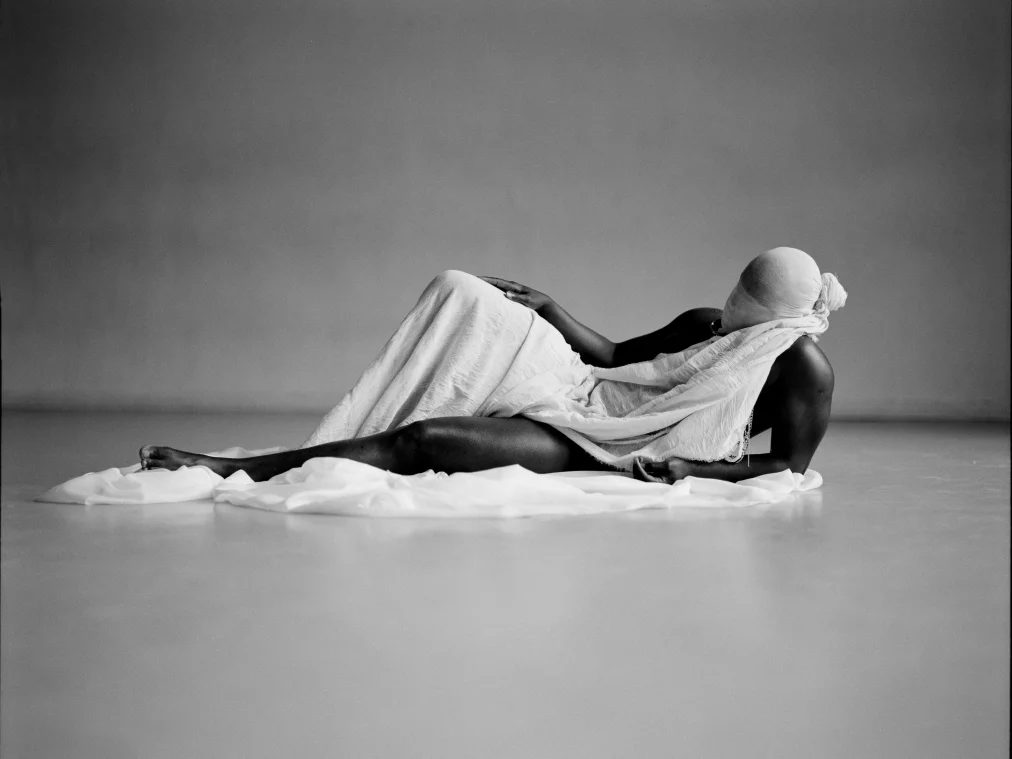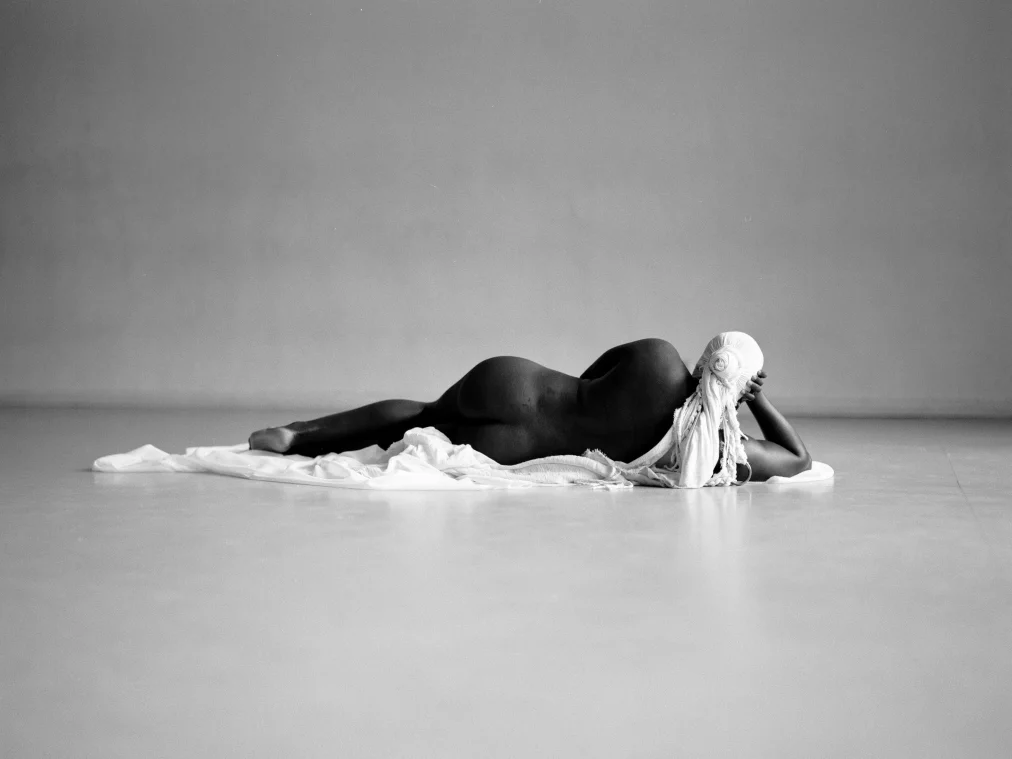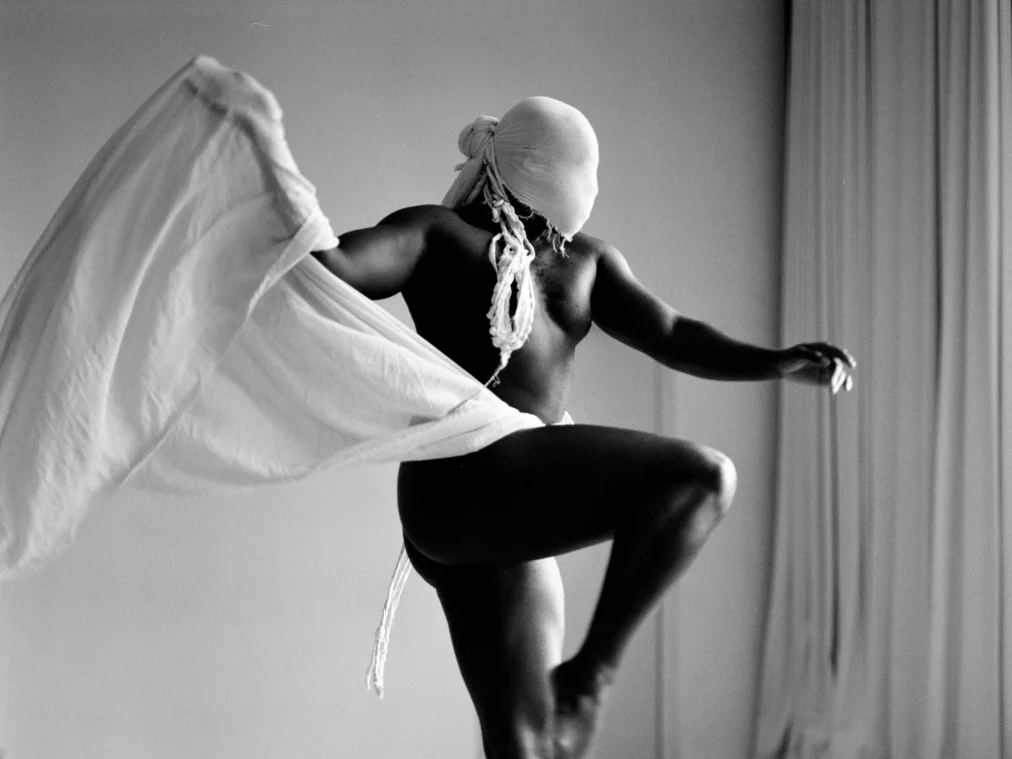Djibril Sall: DJAM LEELII, a Necroromantic – Sophiensæle | Independent Theater in Berlin
Djibril Sall:
DJAM LEELII, a Necroromantic

DJAM LEELII, a Necroromantic is a solo performance by Djibril Sall that maps the topography of deathly Blackness onto the Atlantic Ocean. Race emerges here not only as a political identity but as an European delusion animated by excessive production and movement of death along sea routes by the necrotic forces of colonialism and capitalism. This work navigates the entangled currents of race, migration, and displacement through the transformational energy of the ocean in order to abstract this history and project it onto the interiority of this solo performance.
Just as the Atlantic is the historic site where humans are and were stripped of their context to be converted into fleshly metal, into living corpses, into Black Things, into drowned citizens, it will become again another site of transmutation—just look, the sun is setting into the horizon of its waters…into a great unconscious, a utopic graveyard. A soft whisper lingers, “djam leelii, the water feels just right.”
The information on accessibility is still in progress and will be updated as soon as possible. If any questions remain unanswered until then, please feel free to contact the communication department at barrierefreiheit@sophiensaele.com or 030 27 89 00 35. Please note that details may change by the day of the event. Therefore, if you find out after you have purchased your ticket that the performance is no longer accessible to you, you can contact us for a ticket return at ticketing@sophiensaele.com or 030 27 89 00 45 until 5 business days after the event (Monday through Friday between 10am and 6pm).
Duration
- Approximately 70 minutes without intermission
Language
- Very little spoken English via sound recordings
Lighting
- The lighting is rather dark.
- There is a moment of complete darkness.
- There is a moment with flickering light.
Sound
- There is a continuous sound and music landscape.
- There is a loud moment at the end.
Other
- Stage fog is used.
Audience
- The stands and seating are arranged in a circle. There are various seating options: beanbags and seating mats on the stands as well as classic theater seating (with backrests).
- 2 beanbag seats can be booked subject to availability.
- 2 wheelchair spaces can be booked subject to availability.
Early boarding
- There will be a long admission period. The doors open one hour before the performance begins. During this time, the room is accessible as an installation/listening session.
Early boarding
If, for artistic reasons, the door to the auditorium does not open until very shortly before the performance begins, there is the option of early boarding.
Tickets
- Reservations can be made via the ticket telephone at 030 283 52 66, Monday to Friday from 4pm-6pm
- Via the online ticket shop
- At the box office
You can also find more information about accessibility at the house here.
Concept, Performance, Choreography, Costume: Djibril Sall
Outside Eye: Ashley Temba, Shar Adams
Sound design: YATTA, Djibril Sall
Light design: Thais Nepomuceno
Set design: Yoav Admoni
Dramaturgy: Julien Enzanza
Sound technique: Ari Robey Lawrence
Production: Darcey Bennett
A production by Djibril Sall in co-production with Sophiensaele. Funded by the Capital Cultural Fund (HKF). With the support of the Senate Department for Culture and Social Cohesion, Cité internationale des arts, Emerging Change Festival, Tanzfabrik, sweat variant and Whistle Space. Media partners: Missy Magazine, Siegessäule, taz.
Djibril Sall is a queer Senegalese performer, choreographer and writer. Born in Dakar, he grew up in a working-class family in the Deep South of the United States and was educated at the “elite” Wesleyan University. He describes himself in these terms to illustrate the range of privileges he holds – as someone who has worked from the peripheries of the Global South to someone who can now move unencumbered within and beyond the borders of the Global North. His work is situated at the intersection of (racialized) migration and belonging, where he questions the forces that compel people to leave. This inquiry includes his own migration background and his reflections on (non-)belonging and in-betweenness. The central question he poses to himself and to his audience is: “How can trauma become a departure point for exploring pleasure, letting go, disclosure, and open-hearted connection?”

